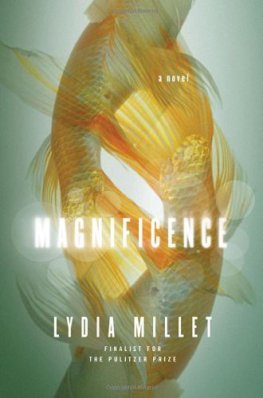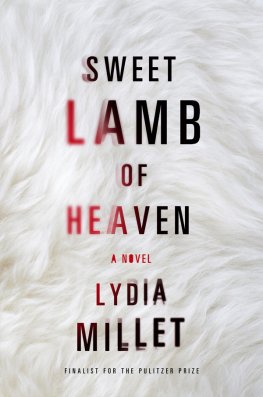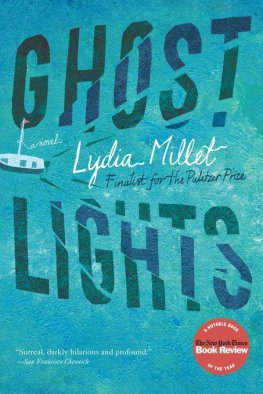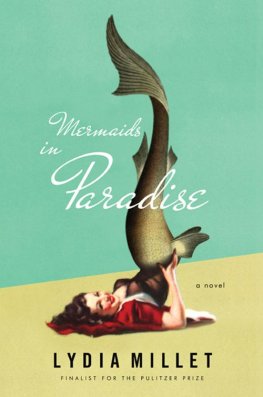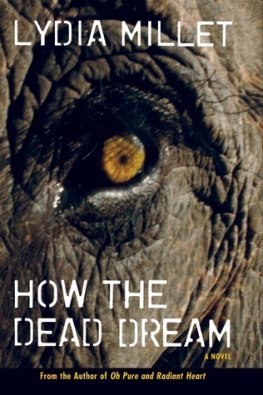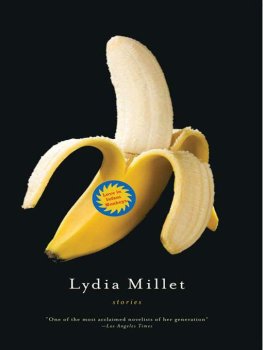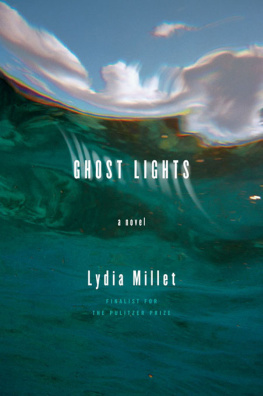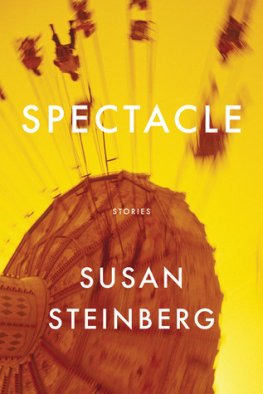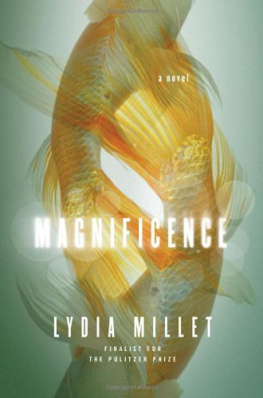The author thanks Maria Massie, Tom Mayer, Jess Purcell, Ryan Harrington, Denise Scarfi, Amy Robbins, Nancy Palmquist, Don Rifkin, Tara Powers, Louise Mattarelliano, Steve Colca, Ingsu Liu, David High, Bill Rusin, Dan Christiaens, and David Goldberg for all that they have done.
It was a stricken love, but still love. It was the kind of love that gazed up at you from the bare white flood of your headlights a wide-eyed love with the meekness of grass-eaters. Soft fur, pink tongue, and if you got too close a whiff of mulch on the breath. This was the love she cherished for her husband.
The love had other moments. Of course it did. But its everyday form was vegetarian.
She suspected it was the love of most wives for their husbands, after some time had passed. Not for the newlyweds that was the nature of the condition but for the seasoned, the ones who had seniority. When she thought of conjugal love she saw a field of husbands stretched out in front of her a broad, wide field. Possibly a rice paddy. They were bent over, hoeing. Did you hoe rice? Well, whatever. The way she saw them, the husbands had a Chinese thing going on. They toiled like billions of peasants.
Technically, historically, and at this very moment in most of the world it was the wives who toiled. The wives toiled for their livelihoods, for the husbands and the little children. Sure; those were the facts. It was the wives, historically and factually in that limited historical, factual sense that were the beasts of burden. Even in the richer places, it was the women who shortened their life expectancy by marrying, whereas the husbands lived longer than their freewheeling bachelor counterparts.
Still, there was something about the essence of husbands that made them seem like sturdy toilers. Husband, housebound. It might be the wives who were bound to the houses, materially speaking, but the husbands were bound to them. This was because of the narrow focus of most men, how they tended to have few intimates, in emotional terms. They left the social bonding to the wives, so they were bound to them.
And she was ready to tell him all the details, if that was what he wanted. She was prepared to come clean. But a toiler could so easily be hurt. A toiler was chronically exhausted from his long days of labor. What labor, you might ask? The labor of being a man, of course. It was hard to be a man. The men were all insane, basically, due to testosterone. You could see it in them, roiling under the surface. The few exceptions proved the rule, and the smart men were big enough to admit it. For instance, steroids made you more of a man, chemically, and also not a coincidence made you insane. Shed read that autism was thought by scientists to be an exaggerated form of maleness. So there was that. The latent madness and retardation of men was compounded by the fact that most of them didnt get to kill their own prey anymore, stalk living things and slay them in a savage bloodletting.
The men, even when they didnt know it, were frustrated by this. They were unfit to live in civilized society.
Of course, women were also subject to hormonal madness famously so. The estrogen or whatever, so-called premenstrual syndrome: the chemicals that, in excess, made them into caricatures of women. Hysteria, for instance, as Freud had called it. Neurosis. That time of the month. Of course Freud had been largely discredited. He had been a philosopher more than a scientist and Americans did not trust philosophers. Far from it. Also he did cocaine.
Still: no question, the fairer sex was more changeable than the unfair one. In practice this meant that the womens madness sometimes receded. But with the men it was constant. When it came to insanity, women were indecisive while men never let up. Oddly the chronic insanity of men was often referred to as stability; the men, being permanent sociopaths, got credit for consistency. Whereas the women, being mere part-time neurotics, were typecast as flighty. Essentially, the female bouts of sanity were used as weapons against them. Sociopaths v. neurotics. It was a nontrivial distinction since many men took the thing a bit too far, frankly, becoming serial killers, wife beaters, dirty cops, or boy soldiers in roving gangs; war criminals, tyrants, and demagogues.
Not so much the women.
In one sense, though, she didnt blame the men. That would be blaming the victim. They were hobbled by their repressed rage and Asperger syndrome, variations on which were lavishly spread throughout the male population, but so what? Far from blaming them she had always loved them, loved them for their sad flaws. The men were tragic heroes. To be a tragic hero, all that was needed was manhood.
She loved them. Yes she did.
Casey was driving her to the airport, down La Cienega at rush hour. There was a comfortable silence between them. Susan gazed out the window at traffic. The traffic was full of men, most of whom were tragic. The tragic men sat in their cars, driving. Some played with radio dials, others picked their noses while staring glassily at nothing. In many cases, completely unaware of their tragic identity. Women were also driving, of course her own daughter, for one; Casey enjoyed driving and drove with speed and a certain measure of abandon and yet these women, including Casey who was in a wheelchair, were less tragic per se than the men. The women might be unfortunate take Casey, for instance but few of them were Ophelia. No, when it came to tragedy the men had slyly cornered the market.
Driving gave Casey a feeling of mastery she didnt have in the chair, since she was higher up when she drove. In the drivers seat she was on the same plane with everyone else: the playing field was level. She was excited now, drumming her fingers on the wheel. Susan felt exhilarated herself. Her husband and her employer, both returning from the tropics. It was a homecoming, a heroes welcome. Though come to think of it, the hero role, like tragedy, was unfairly, readily available to men. When she herself stepped off an airplane, no one would ever shriek in joy, jump up and down and hurl themselves into her arms.
Neither she nor Casey usually smoked but impulsively they had bummed Marlboro Reds off a burly biker at a bar, a guy covered in colorful tattoos with eagles feathering his biceps. The only reason they hadnt progressed to hard liquor, in a further festive gesture, was that the hour wasnt advanced. If Susan drank before sunset she tended to nod off. Her middle age began to show.
They would wait, Casey had said, and have their drinks with Hal and T. They would meet the two men at the airport and take them out to celebrate.
Maybe move into the right lane? she asked Casey.
Oh yeah? Huh. Whos driving?
You are.
Exactly.
Itd be smoother sailing, though. Look!
Mother?
OK, OK.
Relax. Its not so bad. We could be on the 405.
Anyway: she would tell him whatever he wanted to know, he had the right to such knowledge, but all in all it would be far better for him if he never asked.
Of course she would never describe the exact dimensions of her affection to him. Those microscopic inclinations were a best-kept secret out of protectiveness for the other, more than anything a secret she kept to herself, as everyone guarded their shameful, shrugged-in shadings of instinct. No one told the smallest increments of their feelings to their dearly beloveds. No one revealed the minute singularities the slack of an ass, say, how it could cause disgust. The response was involuntary.
There might be those, on second thought, who did reveal such things in times of anger, but mostly those people were not women. She would keep the hurting elements to herself, those subtle insults to a mans self-worth. In certain moments, for instance, his sex could seem a forlorn, pugnacious servant, a servant that bowed its head and had a humble, comic quality. Anyway you could pity something, pity it as a brute and still want to use it: a brute part of a half-child, half-ape. Their handle, their use, their eagerness a panting hound. The metaphor was mixed, she knew that. Her love for husbands was like a love of deer, but then the men themselves were other animals, half-apes, and finally their sexes were doglike. Quite the menagerie, all told.

